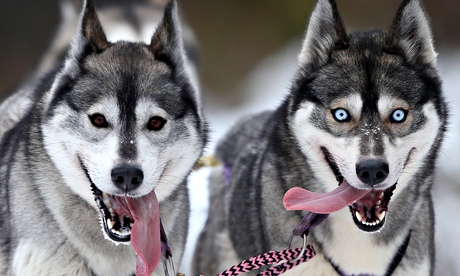
Forget Game of Thrones or Twilight, I blame David Cameron. Ever since his infamous photocall posing with handsome huskies in Norway, the number of Siberian huskies and other wolf-like breeds being abandoned has soared.
The animal rescue charity Blue Cross has seen a 700% increase in husky-type dogs being given up or abandoned over the past five years, with 78 taken in last year. The Dogs Trust reported a similar increase in abandoned wolf-like dogs two years ago.
Huskies are the latest in a long line of craze-led purchases, made in haste, repented at leisure, then dumped by the roadside. When I visited the Secret World rescue centre in Somerset a few years ago, it was inundated with abandoned owls bought as pets because of Harry Potter.
There have been dumped dalmatians (101 Dalmatians), chihuahuas (Paris Hilton, Legally Blonde) and clownfish (Finding Nemo). Japan even had a stag beetle trend inspired by a video game.
The example everyone remembers is Teenage Mutant Ninja Turtles, which led to families buying red-eared terrapins in the early 1990s. When people discovered these 50p-sized creatures grew to the size of dinner plates and delivered a nasty nip, the heroes-in-a-half-shell were deposited in park ponds. Hundreds of these exotic terrapins then gobbled up native wildlife, including ducklings, newts, toads, frogspawn and dragonfly larvae, and 15 years later, park authorities spent a fortune rounding them up.
Is anthropomorphism to blame? Books, television, films and computer games are filled with charming, talking animals that look gorgeous and behave adorably. If only olfactory technology was more advanced, every fictional representation of animals could also communicate how they smell after weeks cooped up in a small house, alongside graphic images of steaming piles of stinking poo.
Until smell transmission moves beyond scratch-and-sniff, a ban on all fictional renditions of real animals would at least unlock creative imaginations to produce wonderful dragons and dinosaurs, and things that can’t be bought off the web in a second. But fictional dragons still inspire people buying the nearest approximation, such as exotic lizards.
Of course we can’t ban cultural representations of animals. When The Wind in the Willows was published in 1908, it didn’t precipitate a pet mole craze. The problem is commerce. The internet is a global pet shop and it is astonishing what you can legally buy on classified sites: marmosets, snakes, puppies, or a whole menagerie in minutes.
The RSPCA estimates there are up to 9,000 monkeys kept as pets in Britain (and some experts fear there are far more) but despite its calls for the UK to follow more than 15 other European countries in having a full or partial ban on keeping primates as pets, the government is loth to do so.
Fearful of appearing illiberal, or giving themselves an enforcement headache, the authorities are reluctant to toughen controls on what is sold online, despite vets linking a huge overproduction of pets in Britain with the growth of industrial-scale puppy farming, where animals are separated from their mothers before they have been properly weaned.
We seem to regard it as our right to buy what we want online. We can’t. Rules stop us purchasing a polar bear or a submachine gun, so we just need to tighten the rules on exotic pets.
Friends of mine recently took a dog from a dog’s home: they were interviewed three times, their home and garden were inspected and their lifestyle was examined. Buying a big pet should be like obtaining a mortgage – an agonising process with loads of ludicrous red tape that ensures we really want the burden of an animal in our lives for a decade or more.
Animal charities don’t generally favour a return to dog licensing but a modern licence could be linked to compulsory microchipping (which finally arrives in England in 2016), and revenue raised could fund a proper regulatory regime. Licensing could, for instance, restrict the sale of big dogs to those who can prove they have the space and time for them.
Cameron is welcome to hug a husky but his government should be braver in confronting the unkind and cruel mess that is the online trade in pets.

